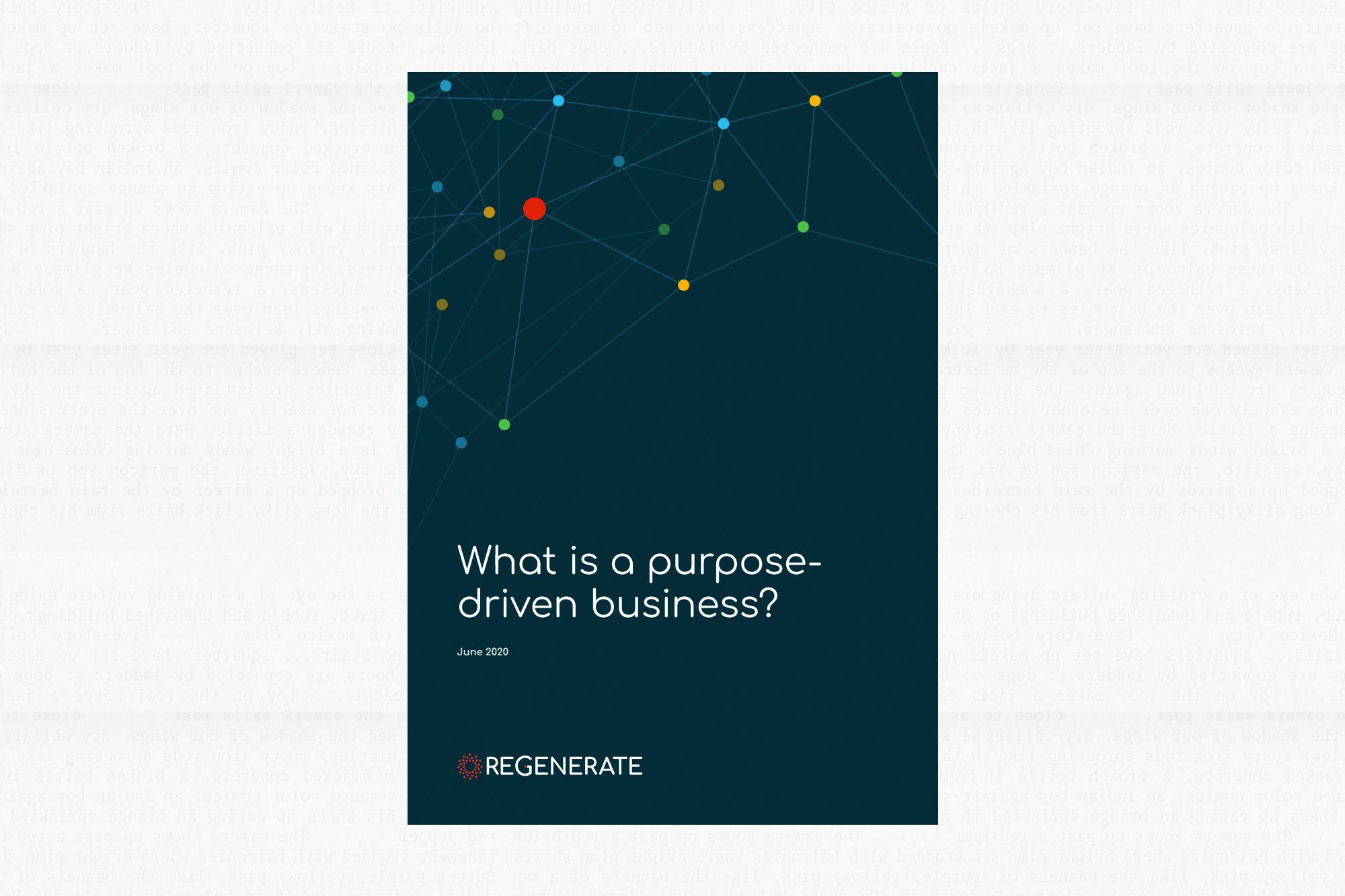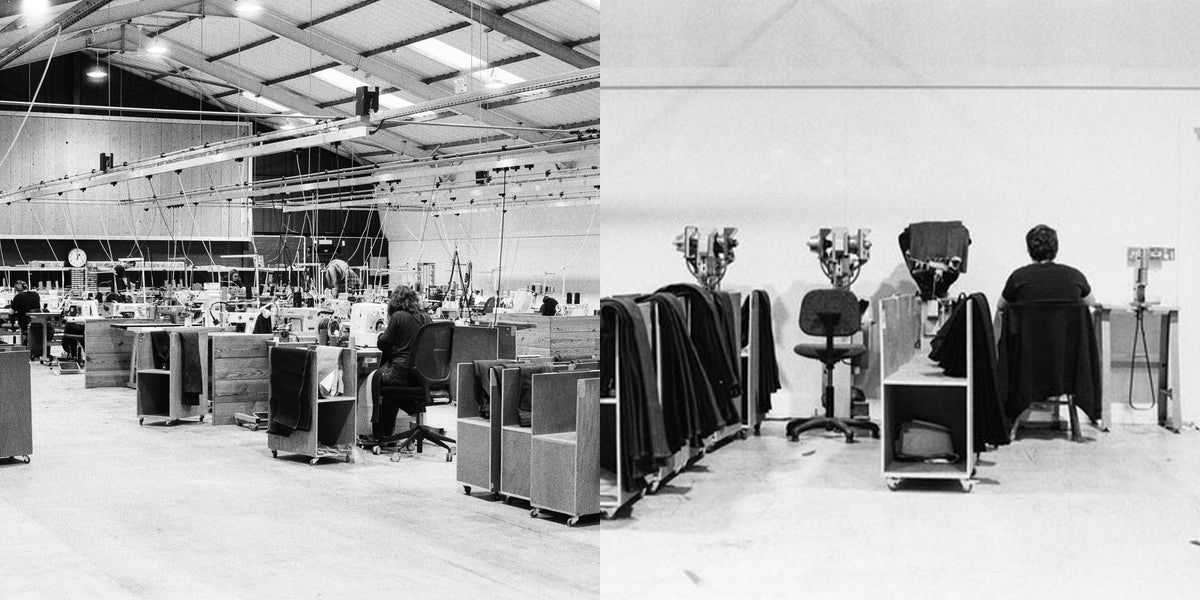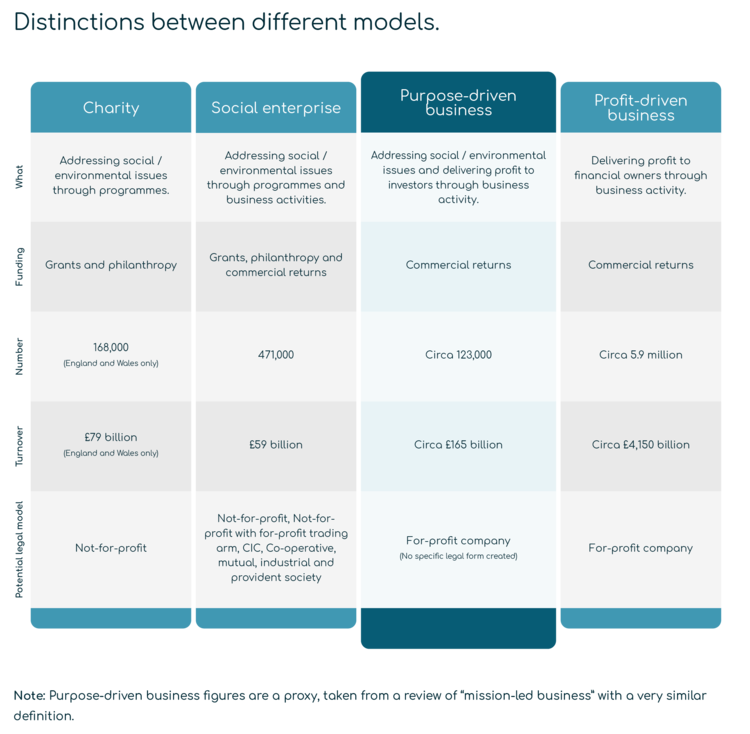Right now, tens of thousands of companies around the world are asking ‘what do we stand for as a business’, and ‘what is our purpose?’.
On the first page of his book Do/Purpose: Why brands with a purpose do better and matter more, Howies and Hiut Denim founder David Hieatt says this about purpose driven companies:
‘These companies have a reason to exist above just to make profit. They have purpose. Yes, we admire the product they make. But the thing we love the most about them is the change they are making.’

This is the key difference of a purpose-driven company – they stand for something, and can communicate that effectively. If your products or services are WHAT you do, your purpose is WHY you do it.
“We need businesses that think deeply about how, by their very existence, they can make the world a better place, to produce profitable solutions to the problems of people and planet, and not to profit from producing problems for people or planet,” says, Professor Colin Mayer, Professor of Management Studies at the Saïd Business School at the University of Oxford.
That quote is important: it talks about profitable solutions. Purpose-driven businesses shouldn’t be confused with the charity arm of a corporation, or a not-for-profit – these are business that make profits, but use those profits in service of their purpose.
Not too many years ago, the prevailing wisdom was that profit and corporate social responsibility were mutually exclusive pursuits. But the tide has changed, bringing with it an opportunity for business leaders to take charge and fulfil environmental and societal needs where other leaders are not – while realising greater commercial success as a result.
We speak to a range of business leaders from across our global community to get some purposeful insights, including:
— Clare Hieatt, co-founder of Hiut Denim
— Sally Hill, founder of Purpose Conference
— Ed Boyd, co-founder and executive director at think tank ReGenerate
— Luke Dean-Weymark, co-founder of B Corp marketing and PR agency Compass Studio

Having a purpose vs. being purpose-driven
Nearly all companies have a purpose statement. It may be proudly on display above the CEO’s desk, or hidden away in a brand guidelines document. Look hard enough and you’ll nearly always find it exists.
But having a purpose and being purpose-driven are two very different things. A perfectly articulated purpose statement that exists solely as a set of words is worthless; for purpose to be valuable it needs to be used to inform day-to-day actions, as well as guide longer-term decisions.

For Sally Hill, businesses willing to make big strides will be rewarded by their customers, she says.
“There’s definitely rebelliousness going on and it’s rewarding for brands who choose to be a bit more radical, which is exciting,” she says. “I challenge companies to think about that side of them. What would they do in their wildest dreams? It’s probably something other people would love them to do, too.
“Our community holds companies to account, but also rewards companies who are doing the right thing. They will advocate for it and evangelise to their friends. We’ve had people switching banks while they’re sitting in their seats, in the audience hearing the CEO speak. We try to promote the idea that ‘every bit of progress is great’ – but people vote with their feet and vote with their wallets and it’s important for brands to be aware of that.”
Doing good is good for business
A quick search online turns up data that shows that there are compelling business reasons for companies that do good in the world.
Perhaps the most compelling data shows that consumers are shifting from value (best product at best price) to values (alignment with the things that I care about) when it comes to purchase decisions. According to the UK Small Business Commission, 88% of consumers are more likely to buy from a company that ‘supports or engages in actions to improve society.’
Data collected between 2013-2018 by the Stern Centre for Sustainable Business shows that products badged as ‘sustainable’ grew 5.6% faster than those not. By 2018, Unilever’s ‘sustainable living’ brands delivered 70% of its growth. More recent data, like that seen in the 2020 Zeno Strength of Purpose study, shows that 94% of global consumers say that it’s important that brands they engage with have a strong purpose. This isn’t going away.
And these customers are also likely to be more loyal to brands that meet their values.

Writing for the Good Business Journal, Chris Miller, Global Head of Activism at Ben and Jerry’s, writes, “Ben and Jerry really pioneered this model of corporate social responsibility. They were on the first wave of that movement. Ben said, many years ago – and it’s a quote we continue to reference at the company –
‘The strongest bonds you can create with your customers is around a shared set of values.’ Those customers who connect with you around something other than just buying a tub of ice cream, are the consumers that are less likely to trade you for Haagen Dazs when it’s on sale. Right?”
It’s also worth considering that consumers are also your employees and business partners. A 2021 Study by Gartner, the 2021 Hybrid and Return to work survey shows that 56% of people surveyed had during the pandemic questioned the purpose of their day-to-day job and 50% had changed expectations towards their employer. 65% said the pandemic had made them rethink the place that work should have in their life.
And what does this data tell us? After a two year period of reflection of how we live and work, and reviewing the brands we engage with, and work for, it appears that it's more important than ever to be clear about what you stand for as a business.
Find your ‘why?’
Although it’s becoming increasingly common for brand to be ‘born’ with a clearly-defined sense of purpose, it’s not always the case. Indeed, much of the growth of purpose-led business is driven by organisations rediscovering a sense of purpose.
Authenticity is the result of doing things for the right reasons, so start by identifying what genuinely matters to you, says Ed Boyd. This can only come from within the organisation.

“The worst thing is someone externally saying, ‘we think this should be the purpose of your organisation,” he says.
“What do you want the legacy of your business to be? You look back in 20 years’ time, you’re answering that question: ‘The world was a better place due to our company existing because X, Y and Z happened.’ What are X, Y and Z? That’s the starting point. It's not a linear journey with the ten things that you can do in order to be purpose-driven. It’s about why you’re coming together as an organisation; what you’re trying to change.”
For Ed, starting with your values, helps to focus your energies. “What are your values and what do you value? This is purely personal, but often it feeds into the business,” he says.
“For example, a fashion business might be really interested in looking at supply chain and carbon emissions. They might think about ethical workers in the garment industry, or where their materials come from.”

For Clare Hieatt, getting this clarity is what drives the business, connects with customers and makes them feel part of something. “A purpose-driven business has a clear vision of what it stands for and where it is going. It gives the founders, the staff, the customers a reason for their relationship with that business, and it encourages passion and promote loyalty,” she says.
“Our purpose was clear: to get our town making jeans again. We knew the planet didn’t need another jeans company, but when we realised how we could benefit our town by reemploying the machinists who had lost their jobs, we knew that this journey wasn’t just about making clothing, it was about regeneration and building community. That gave us the reason and passion to get it started; it brought us a team of loyal staff and it gave our customers something to believe in. It’s a journey we are all on together. When people feel they are part of a bigger purpose than just making profit, it takes business to another level.”
Once you’ve identified what your purpose is, the next important step is finding a way to communicate it in a compelling way that makes it clear to others why you exist and what you believe in. This is where brining in external help from a branding or communications agency can really help.
Actions speak louder than words
While it's ok to talk about your brand purpose in your marketing, it's your actions as a business that demonstrate your commitment to actually having a positive impact and driving change. It's not enough to simply tell the world why you exist, you must also be able to substantiate it by translating that perfectly articulated purpose statement into meaningful actions, both internally and externally. But how?
“Ultimately, a lot of it comes down to the leadership of the organisation and the broader culture,” says Boyd. “Is there a consistent answer to the question: is the world is a better place because this company exists because of X? Do they have a culture that backs that up, measuring and reporting back; do they engage everyone? Are we serving this customer, this employee, this community?”

The best way to ensure you’re using purpose to drive you business is to start with why? When faced with a decision about what to do, or not do. That is, rather than defaulting to just doing take the time to question why you’re doing it and ask yourself if it aligns with your purpose.
When you’ve done something as a business you’re proud of, don’t be afraid to celebrate your actions by communicating to your customers and wider audience. When you genuinely know you’ve done it for the right reason, you should feel comfortable talking about what you’ve achieved.
A word of caution though: Be careful to not get caught up in doing things just so you can talk about them. This is where brands can come unstuck as it brings their agenda into question and has the potential to undermine the authenticity that comes from truly being purpose-driven.

Measuring Impact
But these things aren’t just qualitative, there are tools out there to help gather quantitative evidence that can be reported as evidence of your purpose and impact.
One such tool, which we reference a lot throughout TMRRW™, is the B Lab Impact Assessment. It’s used for businesses looking to certify as B Corps, but can be used by anyone to measure impact.
Certified B Corporations are businesses that balance purpose and profit. They are legally required to consider the impact of their decisions on their workers, customers, suppliers, community and the environment.
“I’m a true believer that B Corp has made our business a better business. Doing the impact assessment is a great overview on everything you’re doing. In order to be assessed, B Corp will measure your impact across the five key areas. Once you've gone through this rigorous process and come out the other side with certification, you will truly want to wear that as a badge of honour to acknowledge that you're genuinely working for a "good" business. Trust me - it's a great feeling.” says Dean-Weymark.

“I’d highly recommend it. It's not an easy process. It's forensic. And it takes months and months. But it made us question a lot of things and put in a lot of systems and processes to become a better business moving forward.”
For Boyd, the B Corp certification acts as a trust marque, making you stand out. “There are ways you can kind of identify intent such as, ‘Did you register as a B Corp? Do you pay the living wage?’ There's a load of markers like that,” he says.
“Do they report their social and environmental impact? Do they have a plan to get to net zero? Are they reporting how they get there? Are they including Scope 3 emissions within the supply chain or not? You need to look at both intent and impact of organisations to identify whether they are.”
The impact reports are effective measurement tools because they show both what a business is doing well, alongside areas to improve. Each B Corp is required to re-certify every three years and impact reports are published online.
Actions for business and organisation leaders
– When looking to define, or refine your purpose, take Dean-Weymark’s advice and start with identifying the things that matter to you most as a business.
– What do you care about?
– How does this align with what you do as a business?
– What can you capably do better today and tomorrow?
– What impact do you want to have?
– What legacy do you want to leave?
– Do one thing well. It’s enough
Don’t try to do too much, too soon. Doing one thing well, changing one thing at a time, will help focus your effort. And changing one thing today, and having the most impact in that area that you possibly can, is enough.
– Stay focussed
Every activity that is not aligned with your purpose is a waste of resource. And worse, it will confuse your stakeholders and customers and make them ask, ‘Is this company who they say they are?’ Not good.
– Measure, measure, measure
A third party accreditation like B Corp will hold you to account as you have to report on your impact areas. But there’s nothing stopping you releasing an annual impact report, or even a series of blogs, showing the things you’re working on and working towards.
– Be transparent
Share your purpose, your challenges, your wins and your losses. This is your substantiation. Your stakeholders and customers are looking for it.
Dive Deeper














